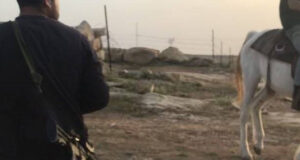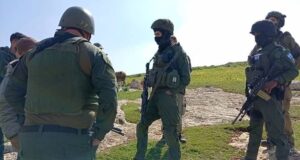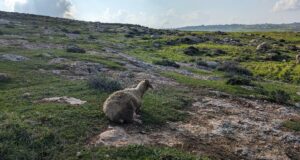By Nina and Saffron
25 July 2012 | International Solidarity Movement, West Bank
Over 33 Palestinian-owned olive trees were uprooted by the Israeli military in the village of Qusra, near Nablus, when the military entered the village around 7 a.m. on Tuesday, July 17. For one hour and a half, Israeli soldiers and equipment uprooted the olive trees.
When International Solidarity Movement (ISM) volunteers arrived, the Israeli soldiers had already left, but four armed border police officers appeared in an armoured vehicle. Three Qusra residents took the ISM on a tour of the land that was cleared earlier that morning. The border police followed closely. Nothing was visible but holes in the dry soil where the trees used to stand.
The farmer who owns the land explained that the field had not been worked on for 18 years. This served as the legal argument for the clearing. The military had no formal court order, which is otherwise required, for the uprooting, and they came without warning.
The two other young men showing ISM around were approached by the border police and asked to present their identification. As they were not carrying ID on them, the officers detained them behind their vehicle and ordered the internationals to leave the field. When the young men reappeared, they said that they were violently searched and threatened against talking to internationals.
“I said I didn’t know who you were, so that I would not get arrested,” said one of the young men, “but if you had not been here, they would have beaten me and probably arrested me. Now they are too afraid of your cameras.”
The uprooting of olive trees and the consequent destruction of livelihood may be one of the gravest threats that the people of Qusra face from the Israeli forces which occupy their land. It is by no means the only one.
Walking through Qusra, the young guides point to a home that has recently received a demolition order.
Later, ISM volunteers visited a shelter belonging to Qusra resident Fathallah Abu Readeh. He explained how he one morning he awoke to a note from the Israeli authorities ordering him to remove the shelter within 7 days, along with some scrap cars on his own land. The note was written in both Arabic and Hebrew, but as Readeh doesn’t read Hebrew, he missed the correction in the Hebrew text stating 3, not 7, days of notice.
“They did this on purpose, just to be able to punish me,” says Fathallah.
Apart from various forms of harassment by the Israeli military, Qusra is regularly exposed to attacks from the adjacent, illegal Israeli settlement of Migdalim. Earlier this year, a mosque in the village was set on fire by Migdalim settlers.
Nina and Saffron are volunteers with the International Solidarity Movement (names have been changed).
 International Solidarity Movement Nonviolence. Justice. Freedom.
International Solidarity Movement Nonviolence. Justice. Freedom.


